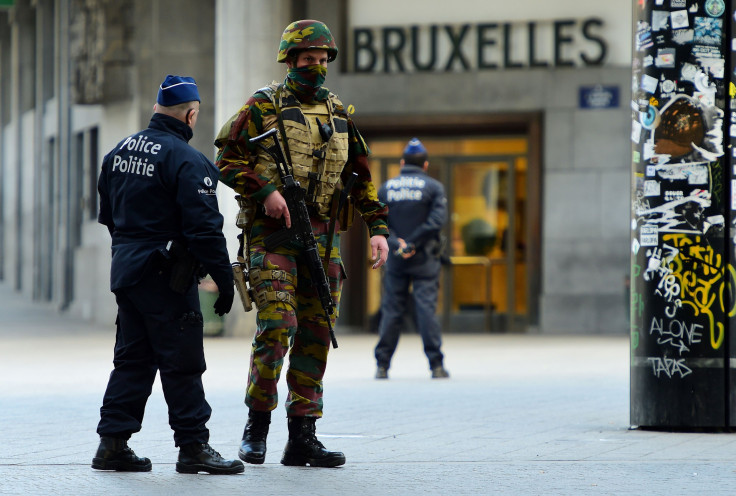Is Brussels The New Home Of Europe Terror? Belgium's Terrorist Recruitment Problem Explained

Commentators were again labeling Brussels as a European terrorism hotbed and Belgium as a country weak on fighting terror following Tuesday’s deadly attacks at an airport and a subway station. Among Western European nations, Belgium has the highest per capita number of foreign fighters in Syria, a problem its leaders have acknowledged by saying more must be done to prevent terrorism recruitment, including better integrating minority populations.
Belgian authorities raised the country's terror alert to the highest level Tuesday and attention again turned to the Brussels neighborhood of Molenbeek, sometimes called Europe’s “jihadi capital” and a “radical den." It's where Paris terror attack suspect Salah Abdeslam, 26, was captured last week, months after the attacks he allegedly plotted, which left 130 people dead.
Abdeslam was found on Rue de Quatre Vents in the center of the Molenbeek neighborhood, four months after the November attacks in France's capital city. His capture has raised questions over how well Belgium authorities have been able to investigate the neighborhood. Following the Paris attacks, Belgian Interior Minister Jan Jambon admitted authorities did not “have a grip” on the situation in the neighborhood.
It remains unclear whether Tuesday’s attacks have ties to the historically working-class neighborhood. The area is a 30-minute metro ride from central Brussels and has a population of approximately 95,000, including a large number of Muslims, and its youth unemployment rate is about 40 percent.
Flags at half staff at the Council of the EU following #Brusselsattacks #Brussels pic.twitter.com/KaoKYSGKm5
— EU Council (@EUCouncil) March 22, 2016
Authorities across Europe’s major cities have acknowledged problems of economic disparity that could be a factor driving some people to join terror groups, along with large, homogenous populations living in one area -- so-called concentrated clusters. The small Lisleby district of 6,000 in Norway has seen eight people leave for the Middle East over the past year, according to a report from the security intelligence group Soufan.
Experts have estimated that since 2012, approximately 500 men and women have left Belgium for Iraq and Syria. About 100 of those people were residents of Brussels, many calling the Molenbeek neighborhood home.
More than 100 people have since returned to Belgium from Syria, with many of them facing arrests and families of relatives being subjected to law-enforcement raids on their homes. Belgium has opened 60 new anti-terrorism cases so far in 2016, the Associated Press reported. The country dealt with 315 anti-terrorism cases in all of 2015.
Jambon said 18 months ago that an average of 15 people a month were leaving Belgium for Syria and Iraq. That number has now fallen to less than five a month. He said Belgian authorities still needed to do more, acknowledging the difficulty in finding all potential terrorist recruiters and the need to increase efforts to integrate minority populations. Belgium has a population of 11 million, and approximately 6 percent are Muslim, according to statistics from the Pew Research Center.
“We’re talking about third- and fourth-generation [immigrants]; these youngsters are born in Belgium, even their fathers and mothers are born in Belgium, and still they are open for these kind of messages. This is not normal — in the U.S., the second generation was the president; here, the fourth generation is an IS fighter — so that is really something we have to work on,” Jambon told CNN prior to Tuesday’s attacks, using an acronym to refer to the extremist Islamic State group.
“The secular nature of Western European countries like France and Belgium, which top the poll for the highest number of fighters per capita, coupled with a sense of marginalization among immigrant communities, especially those from North Africa, appear to have played a role in the radicalization process,” the Soufan Group said. “Against this sense of alienation, the propaganda of the Islamic State offers an attractive alternative of belonging, purpose, adventure and respect.”
Experts estimate approximately 20,000 foreign fighters are currently in Syria and Iraq with approximately 4,000 of them coming from Western Europe, said a report from the International Center for the Study of Radicalization and Politics at King’s College in London released at the end of January.
While Belgium has the highest per capita numberof people leaving for Syria and Iraq, the EU’s most populous nations have seen the highest numbers of recruits with approximately 1,200 people leaving France, 500-600 leaving the U.K., and 500-600 leaving Germany. Outside of Europe, Saudi Arabia, Tunisia and Russia have all seen over 1,000 people leave to join the radicals. Experts warn the numbers are estimates and could be conservative because it is difficult to track and verify the exact numbers.
© Copyright IBTimes 2024. All rights reserved.






















